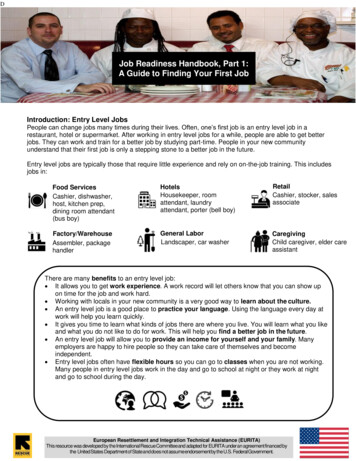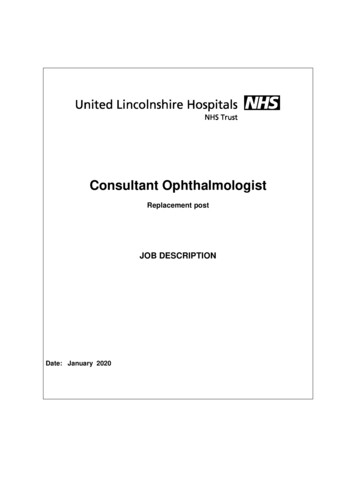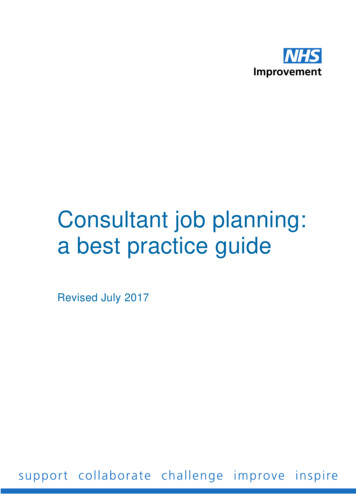
Transcription
Consultant job planning:a best practice guideRevised July 2017
Delivering better healthcare by inspiringand supporting everyone we work with,and challenging ourselves and others tohelp improve outcomes for all.
ContentsIntroduction . 4How to do it . 5Getting started . 5Why data systems are crucial . 5Making it an annual process . 6If a job plan is not agreed . 7Medical job plan consistency committees. 7What should a job plan contain? . 9Defining a job plan . 9Key elements. 9We are working hard to improve our presentation of information.How did you find this report? We’d value your comments.Please send them to: NHSI.Editorial@nhs.net3 Consultant job planning: a best practice guide
IntroductionJob planning is a professional as well as contractual obligation for consultants andemployers. Regular reviews of the efficient and effective use of consultants’ time arecritical during a period of rapid change in both medical technology and healthcaredelivery systems. This guide offers advice to trusts to ensure that their approach toconsultant job planning is consistent with best practice.Trust boards will wish to be assured that local processes reflect this advice, and willnote our emphasis on ensuring an annual job planning meeting for all consultants.Trust boards will also note the crucial role of adequate electronic data systems inrecording consultant job plans.4 Consultant job planning: a best practice guide
How to do itGetting startedThe job planning process should be devised with the local negotiating committee in aspirit of collaboration and mutual respect. It is important to create the right climate byadopting a non-threatening partnership approach rather than a coercive one. Theoverriding principle should be to apply the 2003 consultant contract1 fairly andconsistently. Although job planning and medical appraisal inform each other, theyshould be separate processes.Start with a meeting between all doctors in the specialty team (consultants, specialistand associate specialist doctors) and the clinical director and/or service manager.Clinical directors must be clear about their job planning responsibilities, and betrained and supported to carry them out. They must have adequate information aboutthe trust’s commitments to clinical, educational, research and improvement activityfor the coming year and a record of what has been achieved in the previous year.The initial meeting provides an opportunity to share this information, review theoverarching team’s objectives and ensure fair treatment for all. While eachconsultant’s job plan is an individual contract, individual consultant objectives shouldbe determined within the specialty team objectives. Individual job plans should beconsidered collectively to see how they fit together and work as a whole towardsmeeting patients’ needs and fulfilling trust contracts.Why data systems are crucialThe administrative burden associated with job planning is considerable. Successdepends on having systems in place and information available. To plan properly forservice delivery, job planning must be informed by relevant data: this will highlightdemand on the service and capacity to meet it, which in turn will show how job plansmay need to change.Trusts should consider investing in electronic job planning software if they do notalready use it. All consultants should have an agreed job plan entered onto theelectronic job planning system by 1 April each year. Trusts should ensure job -and-dentalconsultants/consultant-contract-(2003)5 Consultant job planning: a best practice guide
are uploaded on the electronic system for all newly appointed consultants, to reflectthe job plan they were appointed to fulfil.Making it an annual processJob planning is an annual requirement for all consultants on the 2003 contract. Jobplans that worked this year may not work next year. While some consultants continueto work the same pattern every week, changing patterns of service delivery –including ‘consultant of the week models’ – and consultant preferences increasinglydemand variable patterns from week to week or fully annualised job plans. Inaddition, job plans may be reviewed in-year in response to activity changes ororganisational change (such as gaining or losing business). Linking the job planningcycle to the trust’s business planning timetable may help align consultant andorganisational objectives. This can be mutually beneficial but also complex. Toensure all consultants have an approved job plan by 1 April each year, this is a guideto the annual job planning cycle:Annual job planning cycleQuarter 2 – July toClinical director sends out preparation for andSeptemberinvitation to job plan review, including letter and diarycard with preparation guidelines, giving six weeks’notice.Quarter 3 – October toDecemberTeam job planning meeting to discuss and agreeobjectives, supporting professional activities list andany required rota changes.Individual job planning meetings take place.Job plans entered on electronic job planning systemby 31 December. This allows three months for themediation/appeals process.MJPCC (see page 7) reviews outstanding issues anda sample of agreed job plans to ensure consistencyacross clinical management groups/clinical areas.Quarter 4 – January toMarch the following yearMediation and/or appeals completed as soon aspossible, in line with the timeframe agreed under the2003 consultant contract.Pay progression and clinical excellence awardseligibility taken forward for all who have an approvedjob plan.Quarter 1 – April to Junethe following yearJob plan effective 1 April.Mandatory training to begin for the year.6 Consultant job planning: a best practice guide
If a job plan is not agreedConsultants are expected to participate satisfactorily in the annual job planningprocess; failure to do so will constitute one of the grounds for deferring payprogression for the year in question. Consultants should not be penalised for failingto meet objectives for reasons beyond their control, whether this is due to a lack ofagreed supporting resources or another reason such as illness. However, bothemployers and consultants have a responsibility to identify potential problems withachieving objectives as they emerge rather than waiting for an annual job plan reviewmeeting.Where a job plan has not been agreed because it is in dispute, and is subject toongoing mediation or appeals processes, the individual should also not suffer anydetriment. More information on mediation and appeals procedures can be found inAnnex 2 of the BMA/NHS Employers document, A guide to consultant job planning.2Medical job plan consistency committeesTo make sure job planning is consistent between specialties and clinicalmanagement groups (CMGs), and to provide assurance that job planning is in linewith trust guidance, we recommend trusts consider setting up a medical job planconsistency committee (MJPCC) as outlined below.MJPCC: terms of referenceCore members Purpose Outcomes Frequency of meetings2medical director representativehuman resources representativetwo local negotiating committeerepresentativesrelevant clinical directors as requestedto ensure consistency and an even-handedapproach across the trust, as well ascompliance with the framework, the contractand all national guidancenot mediationnot an appealmake suggestionsreturn the job plans to the relevant clinicalareaadvise as requested based on national termsand conditions, this framework and guidanceAs required to work through the job plans – likely tobe more frequent initially.http://www.nhsemployers.org/ /media/Employers/Publications/Guide to consultant job planning.pdf7 Consultant job planning: a best practice guide
MJPCCs can evaluate individual job plans using a RAG (red, amber, green) ratingbased on these criteria:Green: consistent with trust job planning guidanceat least matches with contracted programmed activities (PAs – see page 10) objectives are definedminor queries addressed evidence explains variationevidence explains variance within a specialty.Amber: queries remain outstanding clarification provided has not given assurance job plan significantly over-contracted PAs clinical administration 1PAsupporting professional activities (SPAs – see page 11) 2.5 SPAs not described appropriately or without objectivesquery about on-call commitment (no diary exercise in last two years; change in rotafrequency, etc).Red: no job plan providedjob plan totals under-contracted PAsqueries from CMG remain outstanding clarification provided to CMG has not given assurance, with implication forcontracted PAs.8 Consultant job planning: a best practice guide
What should a job plancontain?Defining a job planA job plan is an annual prospective agreement between employers and consultantsdescribing: the work the consultant does for the NHS organisation and, in the case of clinicalacademics, what work they also do for the university the objectives to be achieved by the consultant and supported by the employer(s)when that work is donewhere it is donehow much time the consultant is expected to be available for workwhat this work (quantified where possible) will deliver for the employer(s), employeeand patientsresources necessary for the work to be achievedany flexibility around these working relationships and interactions that the consultantmay have outside their primary role for the employer. Key elementsJob plans should contain an agreed baseline of commitments detailing attendanceand activity expectations for the year ahead. These should be transparently reviewedand agreed, and be clearly documented for future reference. Activity expectationsshould be based on a minimum of 42 to 44 weeks in the working year. A job plancovers the whole of the week, including – where relevant – weekends and nights (toensure consistent delivery of high quality patient care).Key elements in a job plan are: objectivesdirect clinical careon-call and emergency worksupporting professional activities such as clinical audit participation, casenotereview and other activities relevant to the individual’s revalidationadditional responsibilities and dutiesexternal dutiesprivate professional servicesfee-paying services9 Consultant job planning: a best practice guide
travel timeannual leave and study leavesupporting resources.A full-time job plan consists of 10 programmed activities (PAs), some for directclinical care and others being ‘supporting professional activities’ (see page 11). Theoverriding principles are that the job plan is prospective and that work agreed mustbe done. The trust has a responsibility to provide the necessary resources to enablethe work to be done. However, both parties have a duty to raise problems inachieving objectives in a timely manner.Trusts may request medical staff to work more than 10 PAs per week or to take onadditional responsibilities. If so, the consultant and the clinical director or managermust agree the additional PAs or responsibility allowance. We recommend additionalPAs are reviewed annually as part of the job plan review. However, we alsorecommend that both parties can end the agreement outside the job planning reviewwith three months’ notice.We recommend that additional programmed activities should be direct clinical carework unless specifically agreed with the trust during job planning.PAs may be timetabled over one or more weeks by agreement with the clinicaldirector/manager. The schedule of PAs should reflect this.ObjectivesThe job plan must help achieve service business plans and the trust’s organisationalobjectives. Objectives should be based on the latest evidence, subject tobenchmarking where possible and designed to eliminate or reduce variation. Startingwith objectives is the key to aligning consultants and employers, and makes it easierto review and adjust job plans. You should agree objectives in ‘SMART’ form – thatis, they should be: anslating the trust’s objectives into meaningful, measurable objectives in job plansallows consultants to identify changes required to support growth and efficiency intheir service and ensure it remains attractive to commissioners.Direct clinical careDirect clinical care is work directly relating to the prevention, diagnosis or treatment ofillness, ie clinical and clinically related activity. The consultant’s schedule of PAs10 Consultant job planning: a best practice guide
should clearly describe the type of direct clinical care activity, as well as when andwhere it is undertaken.Sufficient ‘direct clinical care’ should be allocated for patient-relatedadministration. This will vary between specialties. Where consultants are spendingtoo much time on these duties, the trust should investigate and try to reduce it byproviding support services. Where administration exceeds one PA per week, themedical job plan consistency committee (see page 7) should review it. Werecommend all administrative direct clinical care be done on-site without exception.Clinical managers are expected to clearly identify through job planning how thetrust’s activity targets can be met. They should identify and commission anyadditional activity needed, or identify how to replace direct clinical care no longerrequired. Clinical managers should try to allow for unforeseen events during the yearwhen planning how to meet their service delivery requirements.On-call and emergency workThis is recognised in two ways: an availability supplement and a PA allowance fortime worked. All consultants on the same rota at the same frequency should have thesame availability supplement and the same PA allowance for hours worked.On-call rotas should be monitored by a diary exercise at least every two years, moreoften if a change has taken place or if either side requires a review. It is a mandatoryrequirement for consultants to undertake a diary card exercise when asked to do so.The definition of on-call duties and emergency work is in schedules 8 and 16 of theterms and conditions of service for consultants on the 2003 contract.Depending on the frequency of on-call duties, we recommend that the diary exerciseshould include at least two to three on-call cycles for the outgoing job plan year todetermine a fair average. Teams on the same rota can perform a combined diaryexercise over two to three weeks. Consider keeping a continuous diary card duringthe job plan year.Supporting professional activitiesSupporting professional activities (SPAs) underpin direct clinical care and should belinked to clear objectives. The Academy of Medical Royal Colleges estimates that 1to 1.5 SPAs per week are the minimum for a consultant’s continuing professionaldevelopment (CPD) for revalidation purposes. Typical SPAs for CPD for revalidationinclude: preparation for revalidation, personal study, eg CPD and attending trusteducational meetings, grand rounds, audit meetings etcpersonal/professional administration, eg preparation for appraisal and jobplanning, completing 360-degree feedback for colleagues etcmandatory training as defined by the trust/medical directorany additional mandatory training relevant to the specialty group11 Consultant job planning: a best practice guide
attendance at departmental audit and clinical governance meetings,contributing to national audits etcbasic undergraduate and postgraduate teachingattending regular specialty consultant meetings.Trusts may consider approving more SPA time for additional non-direct clinical careactivities. These may include: educational supervisioncollege tutor responsibilitiesformal teachingleading clinical governanceconducting medical appraisals for other doctors (not your own)additional management meetings required for the service/trustspecific committee workspecific project workresearch agreed in advance, with objectivesspecific roles and responsibilities within the departmentspecific service development projectsnational roles (specialist societies, Royal Colleges, NICE etc).Consider SPA time for part-time staff in the light of their overall commitment to theorganisation and any other consultant employment in the job plan. In somecircumstances this may mean part-time consultants will have proportionally moreSPA time than the typical allowance.Many trusts employ long-term locum/fixed-term contract consultants. If they areemployed for more than six months, we recommend they are appointed on contractswith nine PAs and one SPA.We recommend all SPAs are carried out on-site and timetabled, unless agreed inadvance. Trusts should provide appropriate facilities for this. Flexibility on timing andlocation of activity must be agreed between the employer and the consultant to helpservice planning. Any agreed off-site SPAs need to be clearly defined in the jobplan.Where consultants are employed by more than one NHS organisation, it isimportant that clinical directors liaise when agreeing the allocation of PAs.Additional responsibilities and dutiesAdditional responsibility PAs for roles such as head of service, service director,director of postgraduate education or divisional medical director will have anassociated job description and person specification, and a formal process ofappointment.12 Consultant job planning: a best practice guide
External dutiesExternal duties are generally supported by trusts. We recommend that externalactivity, such as work for the Royal Colleges, NICE, General Medical Council etc, isagreed in advance, including the time allocation. We also recommend that trustsrequire consultants, before applying for a role with another body, to discuss it withboth consultant colleagues and the clinical director/manager.Private professional servicesPrivate professional services should be included in the job plan and schedule ofPAs. All private professional services must be arranged and undertaken inaccordance with the Department of Health’s Code of conduct for private practice.3This requires that providing services for private patients should not prejudice NHSpatients’ interests or disrupt NHS services. As part of this, the trust will insist thatconsultants’ private practice is not scheduled during job planned activities.Consultants should ensure private professional services are recorded in the job planand the quality or timeliness of service for NHS patients is not harmed. Employersmay offer up to one extra programmed activity per week to consultants whoundertake private practice. For details of this arrangement refer to the 2003 contract.Job plans: the essentials The job plan is approved by the consistency committee (see page 7). The job plan is available and loaded in electronic format onto the job plansystem (see page 5). Activity accurately reflects what will be delivered during the effective period andservice requirements. Activities have start and end times detailed. Core supporting professional activities (SPAs) meet the requirements of the jobplanning framework and site described. SPA activity with objectives and outcomes are detailed. Objectives are agreed in SMART form (specific, measurable, achievable,realistic and timed). A diary card supports on-call activity and programmed activity (PA) allocation; ifno diary card, PA allocation is consistent. A private practice declaration form is complete; all external activity is identifiedon the timetable. A conflict of interest declaration form is complete.3http://www.nhsemployers.org/ /media/Employers/Documents/Pay%20and%20reward/DH 085195.pdf13 Consultant job planning: a best practice guide
Contact us:NHS ImprovementWellington House133-155 Waterloo RoadLondonSE1 8UG0300 123 Follow us on Twitter @NHSImprovementThis publication can be made available in a number of other formats on request. NHS Improvement 2017 Publication code: IG 01/17
6 Consultant job planning: a best practice guide are uploaded on the electronic system for all newly appointed consultants, to reflect the job plan they were appointed to fulfil. Making it an annual process Job planning is an annual requirement for all consultants on the 2003 contract. Job plans that worked this year may not work next year.
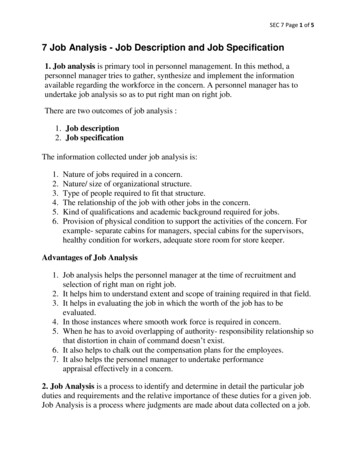
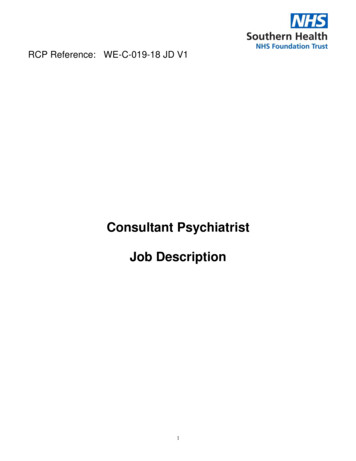


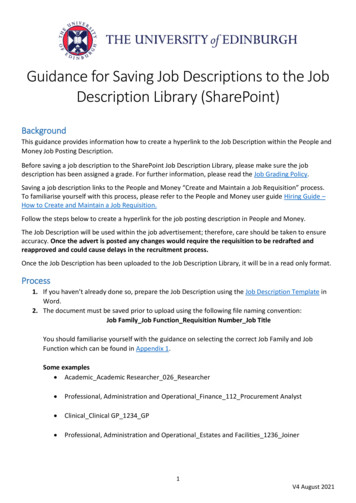

![[CONSULTANT] (1) and - GOV.UK](/img/31/2015-2019-land-and-risk-management-panel.jpg)
